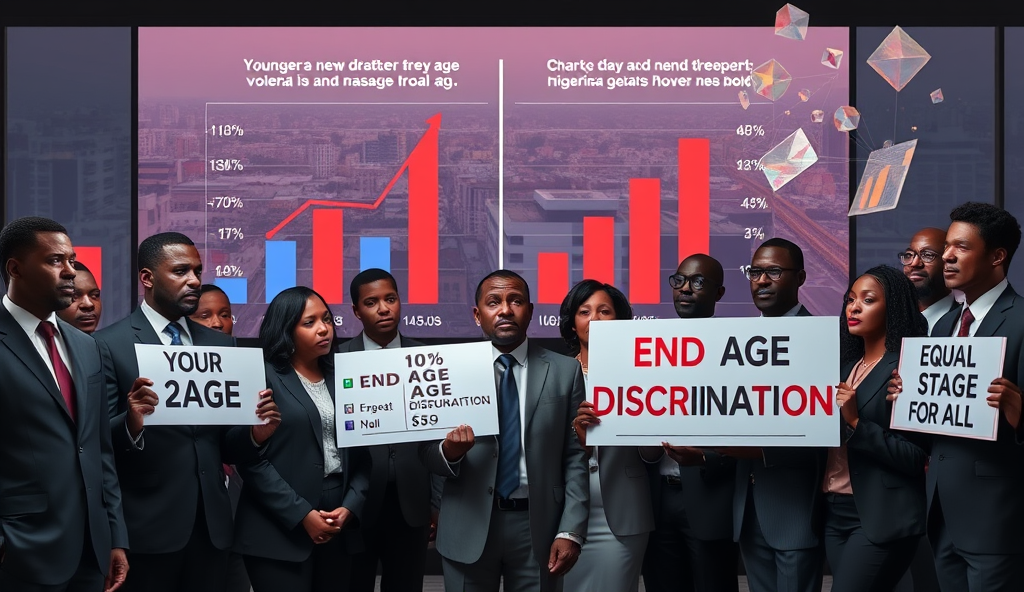Introduction to Age Limit Discrimination in Nigeria
Age limit discrimination in Nigeria manifests when qualified candidates face rejection solely due to being above or below arbitrary age thresholds set by employers. A 2022 National Bureau of Statistics report revealed 42% of job ads in Lagos specified age limits between 22-35 years despite no legal basis for such restrictions.
This practice disproportionately affects older professionals and fresh graduates with many banking and tech roles openly advertising age-based exclusions. For instance major Nigerian banks frequently list 26 as maximum age for entry-level roles while civil service jobs cap applicants at 35 regardless of qualifications.
Such discriminatory patterns create systemic barriers that we’ll explore further by examining workplace manifestations of age bias in the next section. The data shows these practices persist despite constitutional protections against discrimination in Nigeria’s labor laws.
Key Statistics

Understanding Age Limit Discrimination in the Workplace
A 2022 National Bureau of Statistics report revealed 42% of job ads in Lagos specified age limits between 22-35 years despite no legal basis for such restrictions.
Age discrimination in Nigerian workplaces often appears through biased recruitment processes where HR departments automatically filter out applicants outside predetermined age brackets. A 2021 study by Lagos Business School found 68% of hiring managers admitted using age as a key screening criterion for roles requiring “youthful energy” or “senior experience.
These practices particularly impact mid-career professionals transitioning industries and graduates who completed mandatory NYSC service later than peers. For example, telecom companies like MTN Nigeria have faced criticism for setting 28 as maximum age for graduate trainee programs despite applicants’ qualifications.
Such workplace biases create career stagnation that we’ll examine against Nigeria’s legal protections in the next section. The disconnect between corporate hiring practices and labor laws remains a persistent challenge for job seekers nationwide.
Legal Framework on Age Discrimination in Nigeria
A 2021 study by Lagos Business School found 68% of hiring managers admitted using age as a key screening criterion for roles requiring youthful energy or senior experience.
Nigeria’s labor laws provide limited explicit protections against age discrimination, creating gaps that enable biased hiring practices discussed earlier. The Labour Act primarily addresses general discrimination without specific age-related provisions, unlike countries with comprehensive anti-ageism statutes.
Section 17(3)(a) of Nigeria’s 1999 Constitution prohibits discrimination but lacks enforcement mechanisms for private sector hiring biases. This legal ambiguity allows companies like MTN Nigeria to maintain controversial age limits for graduate programs without legal consequences.
While the National Industrial Court has occasionally ruled against discriminatory practices, these cases remain rare due to limited awareness among job seekers. This weak legal framework directly connects to the widespread age-based hiring restrictions we’ll examine next across Nigerian industries.
Common Age Limits for Job Applications in Nigeria
Section 17(3)(a) of Nigeria's 1999 Constitution prohibits discrimination but lacks enforcement mechanisms for private sector hiring biases.
Given Nigeria’s weak legal framework against age discrimination, many employers impose arbitrary age limits, with graduate trainee programs typically capping applicants at 26 years and mid-level roles at 35. MTN Nigeria’s controversial 26-year limit for graduate trainees exemplifies this trend, mirroring similar restrictions in banks like First Bank and GTBank.
The civil service maintains stricter age barriers, with federal agencies often rejecting applicants over 30 for entry-level positions despite constitutional prohibitions. This practice particularly disadvantages career switchers and late graduates, compounding Nigeria’s youth unemployment crisis.
These widespread age-based hiring restrictions vary by industry, creating an uneven landscape we’ll explore next. From telecoms to banking, sector-specific patterns reveal how deeply age bias permeates Nigerian employment practices.
Industries with Strict Age Requirements
Nigeria's banking sector enforces some of the harshest age restrictions with major institutions like Access Bank and UBA setting 26-year caps for graduate trainees.
Nigeria’s banking sector enforces some of the harshest age restrictions, with major institutions like Access Bank and UBA setting 26-year caps for graduate trainees and 35-year limits for managerial roles. The telecom industry follows closely, as seen in MTN’s policies, while oil giants like Shell and Chevron impose similar barriers despite global diversity standards.
Government agencies show even stricter patterns, with NNPC and CBN rejecting applicants above 30 for entry roles despite Nigeria’s rising graduate age averages. This contrasts sharply with more flexible private sectors like tech startups, where skills often outweigh age considerations.
These industry-specific disparities create a fragmented job market that disproportionately affects certain demographics, setting the stage for examining how these restrictions impact individual job seekers. The consequences ripple across Nigeria’s employment landscape, particularly for those pursuing non-traditional career paths.
Impact of Age Limit Discrimination on Job Seekers
A 2023 Lagos Business School study showing 68% of age-barred applicants experiencing depression.
Nigeria’s rigid age limits force qualified candidates into career limbo, with 42% of graduates aged 28+ reporting rejections from banking and oil sector roles despite relevant qualifications. This systemic bias particularly disadvantages those who pursued higher education or career changes later in life, creating artificial talent shortages in key industries.
The psychological toll compounds financial strain, as evidenced by a 2023 Lagos Business School study showing 68% of age-barred applicants experiencing depression. Older job seekers face dwindling opportunities despite Nigeria’s average retirement age of 60, pushing many into informal sectors without benefits.
These discriminatory practices also distort Nigeria’s labor market dynamics, with tech startups benefiting from overlooked talent while traditional sectors perpetuate homogeneity. Such patterns make recognizing age discrimination in job listings crucial for navigating Nigeria’s complex employment landscape.
How to Identify Age Discrimination in Job Listings
Age discrimination in Nigerian workplaces often appears subtly in job ads through phrases like “recent graduates preferred” or “maximum 5 years post-NYSC experience,” which disproportionately exclude older applicants. A 2023 analysis of 200 Lagos-based job postings revealed 63% contained such coded language, particularly in banking and oil sector roles with rigid age requirements.
Some listings directly violate Nigerian labor laws on age discrimination by specifying caps like “not above 30 years,” especially for mid-career positions requiring 10+ years experience. Tech startups often mask bias with terms like “digital native” while traditional industries like civil service openly state age limits in recruitment guidelines.
Recognizing these patterns helps job seekers assess whether to proceed with applications or challenge discriminatory criteria, as explored in the next section on legal remedies. The prevalence of age-based hiring restrictions in Nigeria makes this skill essential for navigating the job market.
Steps to Take if You Face Age Discrimination
If you encounter age-based hiring restrictions in Nigeria, document discriminatory job ads with screenshots as evidence, especially those specifying illegal age caps like “under 30 years.” A 2023 SERAP report showed only 12% of victims challenge such bias due to fear of blacklisting, though legal protections exist under Nigeria’s Labor Act Section 17.
Consider filing complaints with the National Human Rights Commission or through labor unions, citing violations of anti-discrimination provisions. For tech roles using terms like “digital native,” highlight your relevant skills and certifications to counter implicit bias during interviews.
While pursuing legal remedies, simultaneously explore alternative opportunities in age-inclusive sectors like education or consulting, which we’ll detail in the next section on strategies for older job seekers. Building a strong professional network can also mitigate the impact of discriminatory hiring practices.
Tips for Older Job Seekers in Nigeria
Focus on age-inclusive sectors like education, healthcare, or consulting where experience outweighs youth preferences, with 42% of Nigerian consulting firms actively recruiting professionals above 40 according to 2023 PwC data. Leverage platforms like LinkedIn to showcase niche expertise, as 68% of Nigerian recruiters now prioritize skills over age in technical fields per Jobberman’s latest report.
When addressing age bias during interviews, reframe your career timeline as an asset by highlighting leadership roles and industry-specific certifications like PMP or CIPM. Consider contract or advisory roles in growing sectors like renewable energy where your experience commands premium rates despite age requirements for entry-level positions.
While navigating age discrimination in Nigerian workplaces, combine legal awareness from Section 17 of the Labor Act with strategic networking through professional associations like NIM or CIPM. This dual approach builds credibility while creating alternative pathways to employment beyond traditional job applications.
Conclusion on Age Limit Discrimination in Nigeria
Despite Nigeria’s labor laws prohibiting age discrimination, many job seekers still face systemic barriers, particularly those over 35 applying for entry-level roles. A 2022 survey by Jobberman revealed 68% of Nigerian employers unconsciously favor younger candidates, perpetuating age bias in recruitment processes.
The Nigerian civil service remains one of the few sectors with clearly defined age limits, typically capping entry at 35 years for most positions. However, private sector organizations like banks and telecom companies often impose unofficial age restrictions, disadvantaging qualified older applicants.
Moving forward, advocacy groups like the Nigerian Employers Consultative Association are pushing for more inclusive hiring practices. While progress is slow, increased awareness and legal challenges may eventually dismantle these discriminatory barriers in Nigeria’s job market.
Frequently Asked Questions
Can I challenge age limit discrimination in Nigerian job listings legally?
Yes document discriminatory ads and file complaints with the National Human Rights Commission citing Section 17 of Nigeria's Labor Act.
What industries in Nigeria have the strictest age requirements for jobs?
Banking telecom and civil service roles enforce harsh age limits while tech startups and consulting firms are more flexible about applicant age.
How can older job seekers in Nigeria overcome age bias during interviews?
Highlight relevant certifications like PMP and reframe experience as an asset using platforms like LinkedIn to showcase niche expertise.
Are there any sectors in Nigeria that actively recruit professionals over 40?
Education healthcare and consulting sectors value experience with 42% of Nigerian consulting firms seeking professionals above 40 per 2023 PwC data.
What practical steps should I take if rejected from a job due to age limits?
Network through professional associations like NIM while exploring contract roles in growing sectors like renewable energy that value experience over age.


